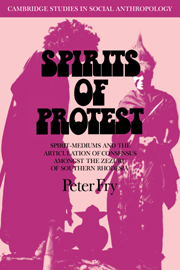 Spirits of Protest
Spirits of Protest Published online by Cambridge University Press: 08 March 2010
The fieldwork situation
Southern Rhodesia in the first half of the 1960s was the scene of many confrontations. African nationalism which had got under way towards the end of the 1950s had been met with a strong white nationalism which swept the polls with the election to power of Mr Smith's Rhodesia Front party. In 1963 the African Nationalist movement split into two bitterly opposed parties, the People's Caretaker Council (PCC) and the Zimbabwe African National Union (ZANU) who fought with one another for the right to represent the mass of the people. During my fieldwork in Chiota Tribal Trust Land, ZANU and the PCC were banned, Mr Smith declared unilaterial independence from Britain, and the world reacted with economic sanctions against Rhodesia. African leaders were rounded up and put either in detention or in restriction in camps miles out in the bush and the situation returned to an uneasy peace maintained by a constantly renewed State of Emergency under which the minority white government used its extra-ordinary powers to thwart any kind of overt opposition on the part of the Africans.
The task of the fieldworker, which is not easy in any situation, was therefore daunting. Anthropologists fall into none of ‘the known and accepted categories, neither missionary nor preacher, trader nor administrator’ (van Velsen 1964 : xix) and there was plenty of scope for both the people of Chiota and the government to imagine what my purposes could be. To begin work in Chiota required the permission of the District Commissioner in Marandellas and of the African council which met in Mahusekwa, the central township of the area.
To save this book to your Kindle, first ensure no-reply@cambridge.org is added to your Approved Personal Document E-mail List under your Personal Document Settings on the Manage Your Content and Devices page of your Amazon account. Then enter the ‘name’ part of your Kindle email address below. Find out more about saving to your Kindle.
Note you can select to save to either the @free.kindle.com or @kindle.com variations. ‘@free.kindle.com’ emails are free but can only be saved to your device when it is connected to wi-fi. ‘@kindle.com’ emails can be delivered even when you are not connected to wi-fi, but note that service fees apply.
Find out more about the Kindle Personal Document Service.
To save content items to your account, please confirm that you agree to abide by our usage policies. If this is the first time you use this feature, you will be asked to authorise Cambridge Core to connect with your account. Find out more about saving content to Dropbox.
To save content items to your account, please confirm that you agree to abide by our usage policies. If this is the first time you use this feature, you will be asked to authorise Cambridge Core to connect with your account. Find out more about saving content to Google Drive.